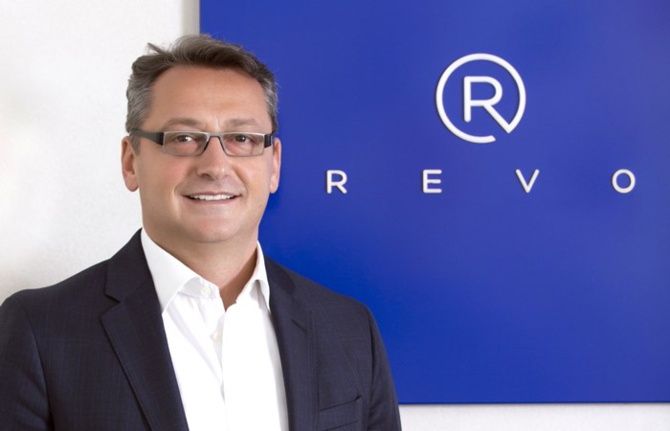Starting this week I’ll be interviewing VCs in Turkey. Cenk Bayrakdar, Managing Director at Revo Capital, explained future plans for Fund II recently announced
As you are aware of I was introducing the Turkish startups. From this week on I will be introducing VCs in Turkey, starting with Revo Capital. Led by Cenk Bayrakdar, Revo Capital closed the Fund I with USD66 million in 2016, being one of largest ones so far. Recently the VC announced Fund II with USD53 million size. Bayrakdar said Fund II will prioritize investments in fintech, B2B cloud, marketplaces, marketing tech, big data, artificial intelligence and health IT. Here is what Bayrakdar told me.
What are your criteria when you invest in startups?
We invest in technological innovation which is about change and challenge, the anathema to the status quo. We have a fundamental belief in the power of founders with innovative ideas to tackle society’s greatest problems, and that there is no problem unsolvable when people and innovation come together.
Key attributes we look for include the founder’s ability to articulate their vision and understanding of the milestones they need to achieve it. So, it helps to have a good idea, a good business plan, and a good thesis around the product as well — these things are more tangible and easier to evaluate. Startups that have demonstrated product-market fit and show a clear path to profitability are more likely to be funded. In addition, we look at business momentum and the solidity of economic fundamentals.
We believe that the role of a VC is not just to provide pure cash injection based on risk assessment. Revo Capital’s model is “smart money” – providing active support in the rapid acquisition of new competences by an organization and determination to actively support founders on their path to global success.
While our top priority is the companies we support, we will be making new investments from Revo Fund II with EUR 53M capital commitments from our cornerstone investors IFC, EBRD and TGIF and institutional and private investors.
As a VC business, how do you raise your capital? How much did you invest so far?
We have long term relationships with our investors, and believe that having an established communication and trust is crucial for their commitment to the fund. This commitment, which is more than 10 years, requires transparency, open and constant communication. Therefore, aside from investing with shared values and goals, we also have other commitments to our investors such as performance reporting and meetings in which we walk through the portfolio progress and updates with our team, strategy and mindset.
In March, we announced our inaugural $2 million investment from Fund II into CY Vision, the vision systems company focused on AR-HUD (Augmented Reality Head-Up Displays). We had allocated a portion of Fund I as a reserve to our support portfolio companies in the turbulent times. We deployed these funds to our investments in Fund I during the coronavirus crisis.
Around two months ago you announced Fund II, your new phase of funding with €53 million. What are your plans with the new fund?
We made the first close of Fund II in March with commitments from EBRD, our cornerstone investor in both Fund I and II, EIF (through its Turkish Growth and Innovation Fund – TGIF), our new cornerstone investor in Fund II, our institutional investors Yıldız Ventures, Finberg, EnerjiSA, QNB Finansbank and our private investors. Last week we welcomed back IFC as one of our cornerstone investors in Fund II, committing €15 million and bringing the fund size to €53 million. IFC is also establishing an additional €15-million envelope for potential co-investment opportunities alongside us.
With Fund II we will continue to support the development of a more dynamic digital economy in Turkey and Central and Eastern Europe (CEE). We will invest in startups that provide technology-based solutions to consumers and to SMEs to help them increase productivity and connectivity. Our investment thesis and mission has not changed, we will back ambitious entrepreneurs with a global aspirations in Turkey, Eastern Europe and the Baltics.
Fund II will prioritize investments in fintech, B2B cloud, marketplaces, marketing tech, big data, artificial intelligence and health IT.
Fund I was one of the largest VC vehicles in Turkey with USD 66m at the time of closing in 2016. We invested in seed- and early-stage startups with an average ticket of USD 1m-USD 2m. We made 20 investments, with 10 of them being leaders in their verticals in Turkey. We already exited four of them. Foriba, the reg-tech startup was acquired by global tax software company Sovos, Mikro-Zirve, the software firm backed by Turkven, acquired Parasut both in March 2019. We also exited cloud services provider Skyatlas. Most recently we marked another successful exit of Peoplise, the innovative human resources software, to Logo Yazılım. We have two additional exits in the pipeline for 2020.
I checked your portfolio and noticed that you heavily invested in Turkish startups. Are you planning to diversify your portfolio?
The key element of any investment lies in people – smart money needs smart people. There is no shortage of these in Turkey – hence the guarantee that our current investments are only just the beginning.
With Fund I and continuing with fund Fund II we are addressing the critical gap in access to early-stage equity, which is scarce in Turkey and other CEE countries. The investment is essential to ensure that the region’s digital startups across various sectors—including software, fintech, and healthtech—are able to scale up their operations and help SMEs grow.
As you compare Turkish startups with global competitors, what are the advantages and disadvantages of Turkish ones?
Turkey is evolving into a very attractive and dynamic startup ecosystem, representing a fertile ground especially for emerging and disruptive technologies, and is starting to have serial entrepreneurs and experienced startup talent driving new companies. Therefore, not coincidently, Turkey is amongst the most attractive emerging countries for the venture capital and private equity industry with respect to fundraising, investment activity and exiting. As a result, we have seen an increase in the number of venture capital funds in Turkey and their investment activity over the past years, coupled with rapid development and globalization of venture capital portfolio companies.
Therefore, Turkish startups have ample capabilities and advantages yet are facing disadvantages as a result of the limited amount of capital and small capitalizations restraining participation in later stages of startup funding. There are very few CEE-based funds investing in growth stage companies in the region. The Turkish and CEE VC market will soon enter a phase when early-stage companies become more mature and require increasing amounts of new capital. Therefore as the amount of capital required is increasing, what we have also observed is a higher number of co-investments, either between domestic funds or domestic and foreign ones. The inflow of capital will result in more startups receiving funding and increasing the probability of the creation of other successful global challengers. Another challenge and development need in our regional markets are a greater quantity and quality of exits.
How did COVID-19 change Turkish startup scene? Which industries will shine out?
Coronavirus is turning global markets upside down and many young entrepreneurs and investors have not been through an economic calamity like this. Therefore, they are now firsthand experiencing how investor sentiments shift in such scenarios. Ultimately the world will be more digital proforma, companies and customers will be more knowledgeable on tech and it will be more important than ever to leverage that.
The first shock of the pandemic crisis to the startup scene was working remotely, with a lot of conversations on managing this and keeping productivity close to 100%. The second shock was helping portfolio companies get through: understanding who is on the brink of a liquidity issue, how this is going to affect the business, scenarios on how deep this will be. Subsequently, we reiterated our position as a proactive resource for founders, especially on understanding and applying to local and international stimulus programs. Exogenous programs for liquidity is a critical piece of the puzzle.
Some of our portfolio companies are experiencing the flip side of this, and are seeing a surge in business and a uptick in interest in transactions. For these companies in our portfolio, we’re actually pushing them to grow even faster. They have a market opportunity now because of these accelerations. It’s likely that the competitive field will be clear because of what’s going to happen over the next 12 months or so. If they are the survivors, they stand to benefit disproportionately.
Overall, very few startups and companies have changed their mission, but virtually all implemented COVID-pivots, redirecting their projects to navigate the eventual transition to the “next normal”. However they will now have to decide whether to return to the original idea, continue with the pivot plan, or attempt some hybrid model. Now is the reconsideration time for businesses, establish real product roadmap, understand how you are helping you clients and figure out how to deliver the value proposition.
-On a global scale, what type of startups will gain importance especially in days of COVID-19?
COVID-19 has been a catalyst for rapid technological change driven by the shift in consumer/enterprise behavior from the status quo; increasing the appetite for experimentation and reducing adoption hurdles especially in fintech, retail, healthcare and education.
We are seeing accelerated interest in disruptive fintech, especially for platforms that simplify consumer transactions. Consumers have turned to contactless card payments as a result of social distancing restrictions, as cash has become an unsanitary form of payment. On the other hand, banking and investing have never been more accessible, but many people remain cautious about the stability and security of digital-only financial platforms.
In the wake of widespread stay-at-home orders, grocery delivery has surged, reversing a recent trend toward restaurant delivery and eating out. It may seem that this shift is temporary and primarily driven by the pandemic, but grocery delivery is likely to continue thriving. Brick-and-mortar grocery stores are now heavily investing in the infrastructure required to meet current demand and defend market share even as restaurants gradually reopen. At the same time, new technologies have emerged to help fuel a shift toward grocery delivery, such as “dark stores” and autonomous delivery. Consolidation will likely be necessary for the online food delivery industry to achieve sustainable margins.
The rise of the digital economy is also putting new pressure on the traditional global supply chain. Businesses are demanding better visibility across delivery and supply channels, quicker shipping capabilities and the ability to source products on-demand to reflect real-time conditions at the consumer level. We view this as a compelling backdrop for new entrants seeking to address gaps in the status quo and see areas of growth across the value chain.
COVID has also enabled us to create virtual health as a new normal. Not only in terms of remote monitoring and acute medical care, but also for advanced care at home.
That’s all I want to know. If you have anything extra, just add it.
Capital efficiency has long been a desirable trait in early/growth stage businesses. But over the last few years, an abundance of capital combined with a “growth at all cost” mindset, allowed founders to deprioritize efficiency. In a post-Covid world, capital efficiency has returned as king. As the fundraising markets dry and sales cycles lengthen, founders will increasingly be forced to think more about efficiency and investors will pay a premium for efficient businesses.
Would you like to support TR Technews?
Hi everyone,
I’m running Turkishtechnews.com, a website on tech developments from Turkey. I will be covering subjects ranging from startups to gadgets, digital economy to social media. I’m keen on new technologies as well. On top of those, I’m interested in drama and cinema, with one short and one long film script and three plays. Holding a B.A degree in English Language and Literature, I’m a tech journalist with 15 years of experience.
The reason why I’m here is to produce good quality journalism and try to remain independent as much as possible. Currently, journalism is torn between vague relationships between brands and journalists, not only in Turkey but also globally. Under such circumstances to remain independent is crucial and I need your support to do so.









